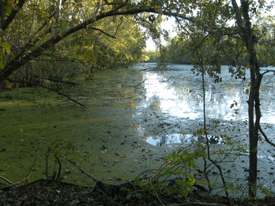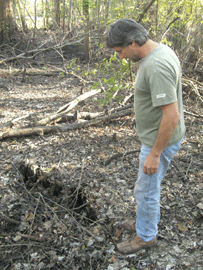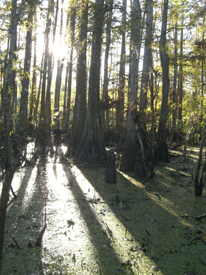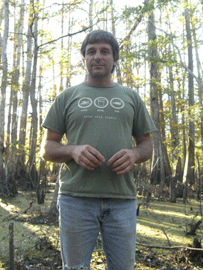Saving the Cypress
Air Date: Week of July 24, 2009

(Photo: Andrew Stelzer)
Gardeners and landscapers use cypress mulch to minimize weeds and keep moisture in the soil. But cypress trees are important storm barriers on the Gulf Coast. As Andrew Stelzer reports from Louisiana, there’s a growing movement to prevent these vital trees from being relegated to mulch.
Transcript
YOUNG: It’s Living on Earth – I’m Jeff Young.
More Americans are scrubbing those black crescent moons of soil from under their fingernails. Backyard gardens are making a comeback.
And that means more business at the garden store for soft feathery mulch, much of it made from ground up cypress. Mulch keeps weeds down and the soil moist. But mulch from cypress could have some unintended consequences.
Cypress trees, some of them ancient giants, form an important storm barrier on the Gulf Coast. Now there’s a move to stop the sale of fiber from those trees. From Louisiana, Andrew Stelzer has the story.
[SOUND OF WALKING IN FOREST, DOGS PANTING]
STELZER: Dean Wilson and his two dogs are rambling through the dense Louisiana swampland about 100 miles west of New Orleans. Wilson is originally from Spain; he fell in love with the swamp 25 years ago and never left. He lives out here in a wooden cabin, on the edges of the Atchafalaya River Basin.
WILSON: Some people call it like going into a fairytale. Its like an enchanted forest, they call it. It's unbelievable. They just can't believe how beautiful it is.
STELZER: We’re surrounded by twisted, gnarled cypress trees and shallow bogs filled with alligators. It’s the largest swamp in the United States; more than 1.4 million acres. But this forest isn’t what it once was.
WILSON: There was a tree here, an ancient tree. It was pretty big. It went all the way from here to right there at or about 6 feet in diameter.

Dean Wilson looks at a depression in the ground where a Cypress tree used to be. (Courtesy of Andrew Stelzer)
HYDE: And we believe that that's because of the destruction of the cypress forest.
STELZER: Dr. Samuel Hyde is a Professor of History at Southeast Louisiana University.
HYDE: Not only do the cypress forests help break the storm surge, but they absorb a lot of the power of the wind force of the storms. And with that region now denuded, we are seeing the storms coming in with extraordinarily far greater violence that they did when the forests were there.
STELZER: There’s always been a demand for cypress lumber; it’s strong, smells good, doesn’t swell when wet, and is naturally insect-resistant. But over the last 25 years, there’s been a tremendous rise in the logging of cypress trees not for construction, but for garden mulch.
CORBITT AD: Well, make sure when you start setting in your flower beds trying to make it pretty, don’t use imitation mulch. Make sure its no-float professional cypress mulch. Here’s why. …
STELZER: That’s the on-hold phone message at Corbitt Manufacturing, a Florida based company that’s one of the biggest cypress mulch producers in the country. Corbitt wouldn’t be interviewed for this story, but has defended its practices as environmentally sound.
CORBITT AD: … and did you know—there are more cypress trees today than there were ten years ago? Cypress trees are a natural reproducer…”

Near the Atchafalaya Basin(Courtesy of Andrew Stelzer)
WILSON: So we followed the trucks from the logging sites, and this truck in particular, when I followed the truck. I took a lot of pictures, so there's no doubt that the truck went from point A to point B.
STELZER: Wilson followed a truck full of cypress logs, which ended up at a Louisiana wood products mill. He couldn’t get inside, so an airplane pilot volunteered to fly him over the mill to take pictures.
WILSON: You can see all the cypress from the air. There are whole trees waiting to be mulch.
STELZER: He photographed cypress trees in front of a grinder, a pile of mulch on the other side, and bags of cypress mulch, labeled as Corbitt’s ‘No-Float’ brand all on the property. Wilson saw similar evidence of trees being ground into mulch when he photographed other mills.
WILSON: We never, ever have seen a truck full of branches and treetops. We flew over the plants, we've never seen a pile of treetops and branches anywhere. That’s not true.
STELZER: Most cypress mulch is sold at major retailers like Wal-Mart, Home Depot, and Lowe’s. Dean Wilson called them to let them know what he was finding. Wal-Mart responded immediately; company officials came down to take their own look around, and in 2008, the superstore chain stopped selling any mulch harvested, bagged, or manufactured in the state of Louisiana. But Wilson soon found one mulch producer in Louisiana was labeling its mulch as coming from Florida.
WILSON: We could not see the nametag, but we have high pixel cameras very good cameras, so we magnified the picture…and look how good you can see the names on the bags. Florida Gold, same company. Corbitt.
STELZER: Another company bagging mulch in Louisiana labeled it as coming from Arkansas. Still another plant was grinding up full cypress trees, then labeling the bags as “forest friendly, one hundred percent sawmill byproduct.” What Wilson found makes it hard for anyone, people or stores, to know what they’re really buying.
WILSON: You find these bags, and they guarantee those people that it's all sustainable. The reality is, this mulch here was coming from a clear-cut, I can show you the pictures— in the middle of the Atchafalaya Basin. That is not sustainable.

Dean Wilson near his house in Bayou Sorrel, on the edge of the Atchafalaya Basin. (Courtesy of Andrew Stelzer)
VANDERSTEEN: Whatever we will harvest, we want to be sure is prepared for regeneration for the next generation.
STELZER: C. A. Buck Vandersteen is the executive director of The Louisiana Forestry Association, an industry group representing loggers, landowners, and forest product producers. He says his members are suffering; at least seven cypress mills in coastal Louisiana have closed, and more jobs will likely be lost.
VANDERSTEEN: Wal-Mart never consulted with us before making this decision to pull out of Louisiana’s cypress market. Had they done that, we would have been able to show them how we manage these lands for sustainable management.
STELZER: With Wal-Mart’s move away from Louisiana cypress, much of the mulch industry, and the debate over it, has shifted to Florida. Dade County banned the products use in new subdivisions. When a county-wide ban was being debated in Polk county, it brought out mulch manufacturers like Brian Mear with the Kemfper Saw Mill. Mear assured the Polk county commission that for him and other producers, the health of cypress forests is a top priority.
MEAR: The real champions of the forest in our state are those who have their living come from it. We have a responsibility to the resource because it’s our income. Guys, it doesn’t make sense for us to go out there and rape and pillage the forest for a dime—we are not that short-sighted.
STELZER: Mulch producers like Mear say that Cypress forests can be replanted; but scientists have found that most of those seeds won’t be able to germinate. Professor Sam Hyde says he doesn’t believe it’s possible to sustainably create cypress mulch, because the trees don’t grow back fast enough, and they are very fragile for the first several years.
HYDE: All you need is a storm surge like Gustav brought last year to get that salt in there again, and all of the work you been doing for the past decade is gone.
STELZER: One solution might be creating an independent body to certify sustainable mulching operations, but as of yet, activists and the logging industry have been unable to sit down at the table together and talk. In the meantime, the Campaign against Cypress Mulch is growing.
[FOREST SOUNDS]
STELZER: Since Wilson began his work, three cities and two parishes in Louisiana have banned the use of cypress mulch on public property. Lowe’s and Home Depot also no longer purchase mulch from Southern Louisiana. He sees these as important successes, but small ones.
WILSON: If we manage to protect the swamps, our great-great-grandkids will be able to see them. We will never be able to see them. It will take that long for them to recover, if they recover at all.
STELZER: More people are becoming aware of the Gulf Coast’s ancient cypress trees. At the same time, cypress mulch is often less expensive that other kinds so demand for it remains strong.
For Living on Earth, I’m Andrew Stelzer, in Bayou Sorrell, Louisiana.
Links
Living on Earth wants to hear from you!
Living on Earth
62 Calef Highway, Suite 212
Lee, NH 03861
Telephone: 617-287-4121
E-mail: comments@loe.org
Newsletter [Click here]
Donate to Living on Earth!
Living on Earth is an independent media program and relies entirely on contributions from listeners and institutions supporting public service. Please donate now to preserve an independent environmental voice.
NewsletterLiving on Earth offers a weekly delivery of the show's rundown to your mailbox. Sign up for our newsletter today!
 Sailors For The Sea: Be the change you want to sea.
Sailors For The Sea: Be the change you want to sea.
 The Grantham Foundation for the Protection of the Environment: Committed to protecting and improving the health of the global environment.
The Grantham Foundation for the Protection of the Environment: Committed to protecting and improving the health of the global environment.
 Contribute to Living on Earth and receive, as our gift to you, an archival print of one of Mark Seth Lender's extraordinary wildlife photographs. Follow the link to see Mark's current collection of photographs.
Contribute to Living on Earth and receive, as our gift to you, an archival print of one of Mark Seth Lender's extraordinary wildlife photographs. Follow the link to see Mark's current collection of photographs.
 Buy a signed copy of Mark Seth Lender's book Smeagull the Seagull & support Living on Earth
Buy a signed copy of Mark Seth Lender's book Smeagull the Seagull & support Living on Earth

